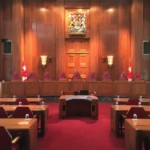By Charles Maduka
Former Central Bank of Nigeria Governor, Godwin Emefiele, has approached the Court of Appeal in Abuja seeking to overturn a judgment that granted the federal government permanent ownership of an estate containing 753 housing units in the Lokogoma area of Abuja.
The Economic and Financial Crimes Commission had earlier secured the forfeiture order on the estate, which was initially linked to another unnamed former government official. However, Emefiele, through his lawyer A.M. Kotoye, argued that he was not made a party to the proceedings, despite having an interest in the property.
“I was unaware of the forfeiture,” Emefiele stated, insisting the EFCC failed to properly notify him. He claimed that the interim forfeiture notice was placed in an obscure section of a newspaper, making it difficult to discover.
He also noted that his attention was divided at the time due to his involvement in three criminal trials in Abuja and Lagos, and accused the EFCC of intentionally keeping the case hidden, despite being in regular contact with him over other legal matters.
The trial court dismissed his objections, stating that the EFCC followed due process and that the newspaper publication was adequate. The court ruled that the notice “could not reasonably be described as hidden.”
Undeterred, Emefiele filed an appeal on April 30, 2025, asking the appellate court to reverse the judgment delivered on April 28, 2025. He is also seeking the nullification of both the interim and final forfeiture orders dated November 1 and December 2, 2024, as well as the approval of his motion filed on January 28, 2025.
He argued that the trial court misinterpreted his application and dismissed it without fully considering essential evidence. According to him, the forfeiture was based on “hearsay, suspicion, and no proper evidence.”
Emefiele further asserted that he holds both legal and equitable interests in the property, contrary to the trial court’s conclusion that he failed to provide proof of ownership.
He described the ruling as “a miscarriage of justice” and added that the judge’s failure to evaluate the affidavit and supporting documents was flawed and had led to an unjust outcome.
“The orders were made in breach of the 1999 Constitution and are therefore null and void,” he said.
Meanwhile, his legal team has written to the Minister of Housing, requesting a suspension of all plans to sell the estate until the appeal is concluded.
“We are aware that the properties may soon be sold to the public. We have already served the EFCC with a notice of appeal and an injunction,” the letter noted.
The federal government recently disclosed plans to sell the housing units to low- and middle-income Nigerians.











Leave a Reply